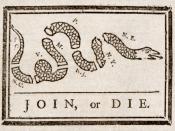Ever since the first colonials were in America, there was a separation between Britain and her colonies. Britain used these colonies to produce new markets (mercantilism) and as a source of raw materials. From the sixteen hundreds up until the mid-seventeen hundreds, Europeans were constantly involved with expensive wars which were enormous distractions. The colonies forced to practically rule themselves throughout this time of ÃÂneglect.ÃÂ This British policy of salutary neglect had profound impacts on American society. It resulted in many various religions, unique legislative assemblies, and the formation of a very diverse commerce.
Through legislative assemblies, the colonies were finally able to make their own decisions. The colonies first developed legislatures for simple dealings; one such legislature was the Virginia House of Burgess, which became the symbol for representative governments. The colonies had individual governments, and they passed laws relating to the situations/people living in that colony. Massachusetts was a colony which had very strict laws, for its legislative assembly was made by the Puritan founders of Massachusetts, whose regulations revolved around the Bible.
In Carolina, the proprietor known as Anthony Cooper had John Locke create a representative government. The neglect presented the chance for the Fundamental Constitutions of Carolina to create a legislative body, which could control taxes and laws even if they were subordinate to the King. This triumph showed the colonials to have self-rule. Self-governing legislative assemblies were also created in New Jersey. Lord Berkeley, who controlled New Jersey, let the colonials create a legislative assembly which inspired the wish of autonomy. This forced Berkeley to give power to William Penn, the man who created Frame of Government for his colonies. It was the first of its kind and held more power than the governor, allowing them to control taxes and laws in the area. These...


